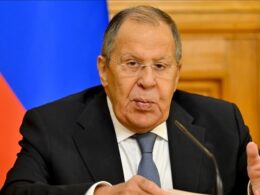NATO allies’ frustration with Hungary is reaching boiling point as the country continues to flirt with Russia. The split widened on 30 October, as Hungarian officials snubbed an invitation to join a Budapest meeting of all ambassadors and military advisers from NATO countries stationed in Hungary.
According to Politico, the aim was to discuss Budapest’s policy of encouraging ties with Russia and China.
“We appreciated the opportunity to discuss Hungary’s new policy with our allies. The fact that a discussion about an ally’s ‘neutrality’ policy was necessary speaks for itself,” the US ambassador in Budapest, David Pressman, said in a statement after the meeting.
While Hungary was a no-show at the NATO meeting, Hungarian Foreign Minister Péter Szijjártó is due to speak at a Belarusian security conference on 31 October alongside his Russian counterpart Sergey Lavrov and even Syrian Foreign Minister Bassam Sabbagh.
Hungarian Prime Minister Viktor Orbán, although he leads a country that has been in NATO for 25 years, has been pushing the concept of economic neutrality, including a “shift from traditional Western alignment.”
“We must preserve our relations eastward and westward,” Orbán said in a radio interview last month.
That has made him an increasingly troublesome ally within NATO and the EU at a time when the West is aiding Ukraine and trying to sanction Russia for its war of aggression.
Hungary has been blocking EU efforts to refund countries for arms shipments to Ukraine, and has made it difficult to use the proceeds from frozen Russian assets to help finance Kyiv.
After years of isolation, Orbán recently gained an ally in Slovak PM Robert Fico — another NATO member. Fico was interviewed by Russian propagandist Olga Skabeyeva this week, saying he plans to visit Moscow for next year’s 80th anniversary of the end of World War II, and that he would meet with Russian leader Vladimir Putin.
Orbán has also turned to freelance diplomacy — often undercutting EU and NATO efforts. He traveled to Moscow in July to meet Putin, even though the International Criminal Court has issued an arrest warrant against the Russian president for war crimes. The EU was outraged that Orbán was presenting himself as representing the bloc; Hungary holds the bloc’s rotating Council presidency, but that doesn’t give Budapest any extra weight in international diplomacy.
On 29 October Orbán was in Tbilisi to support Georgia’s Russia-backed ruling party in the face of condemnation from other EU countries that it had rigged Sunday’s parliamentary election.
There are growing worries that Orbán’s eastern efforts are turning Hungary into an unreliable partner; apart from cozying up to Moscow, he has also been lobbying China to build more car plants in his country.
“Hungary’s newly announced policy of economic ‘neutrality’ and its growing dependencies on Moscow and Beijing have security implications for the United States and Euro-Atlantic interests,” US Ambassador Pressman said.
Sensitive military secrets
There is no mechanism to kick Hungary out of NATO, the world’s largest defense alliance and one that produces and circulates some of the West’s most sensitive military secrets.
Despite concerns about Orbán, senior diplomats from other NATO countries repeatedly told the media on condition of anonymity that Hungarian officials are not excluded from intelligence-sharing or discussions.
Traditionally, if a NATO ally stepped out of line, the US would weigh in. This time, however, Orbán is betting that his ally Donald Trump will win the US election.
“Hungary’s newly announced policy of economic ‘neutrality’ and its growing dependencies on Moscow and Beijing have security implications for the United States and Euro-Atlantic interests,” US Ambassador Pressman said.
Related:
- Bloomberg: France and Germany skeptical of plan to override Hungary’s veto on Ukraine aid
- Diplomatic dispute erupts between Hungary and Croatia over Ukraine
- Politico: Seven NATO members oppose immediate membership invitation for Ukraine
- Politico: EU eyes new Russia sanctions push as Hungary’s presidency nears end
- Hungary in talks with Gazprom for additional gas supplies in 2025
- EU proposes voluntary contributions to bypass Hungary’s veto on Ukraine aid





